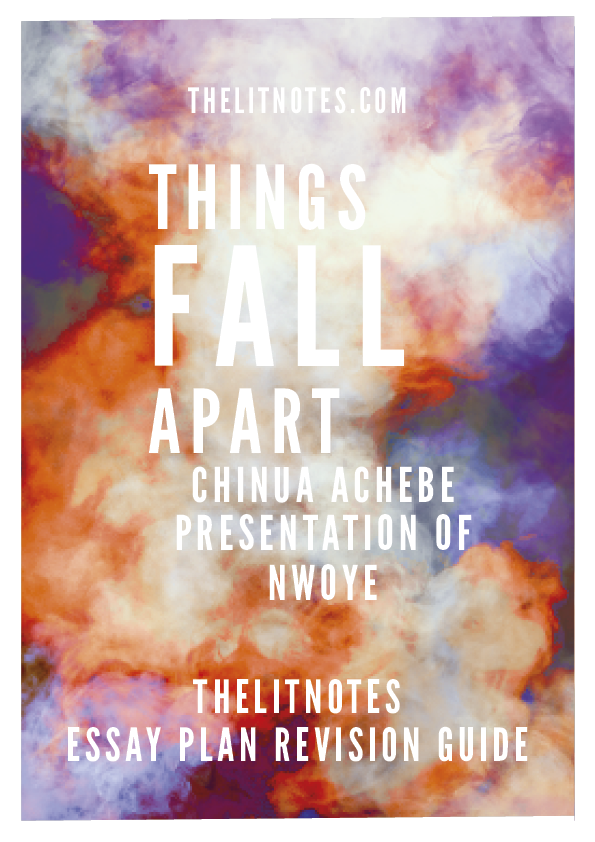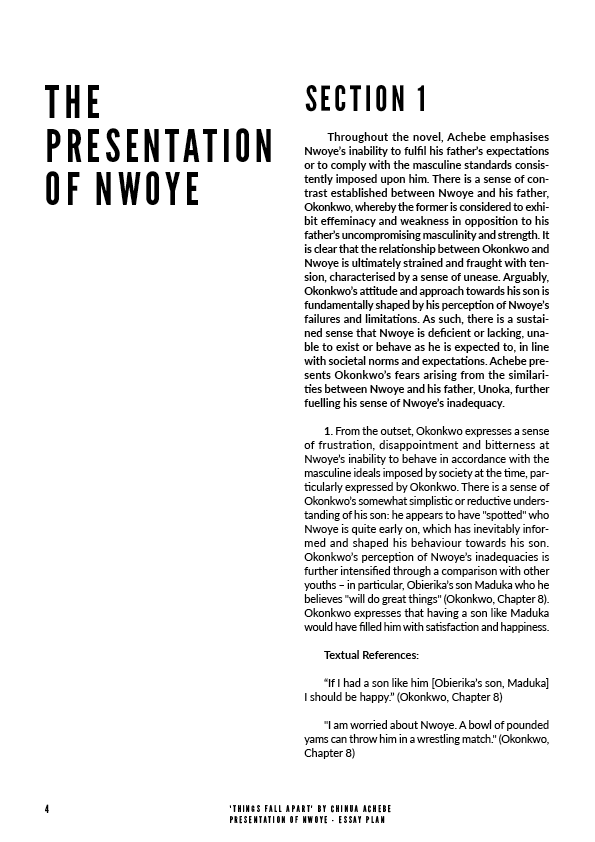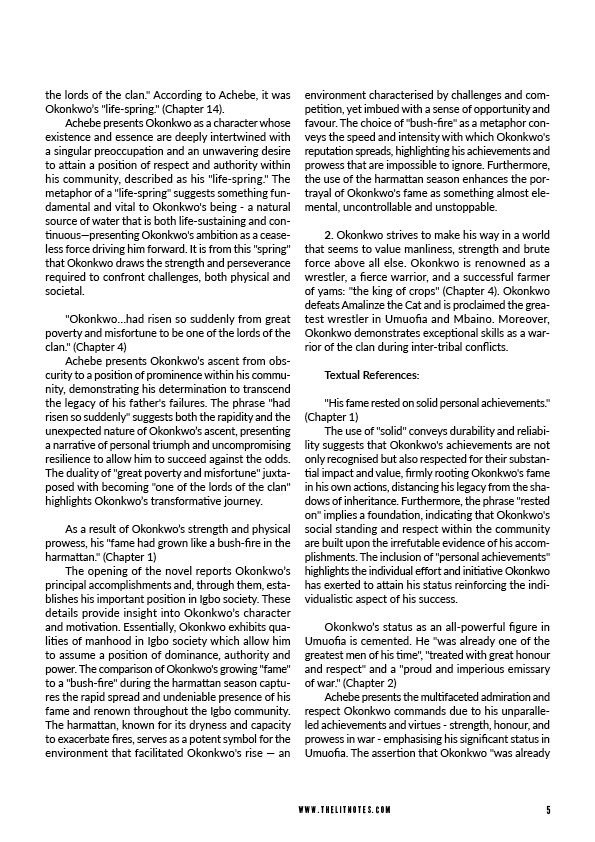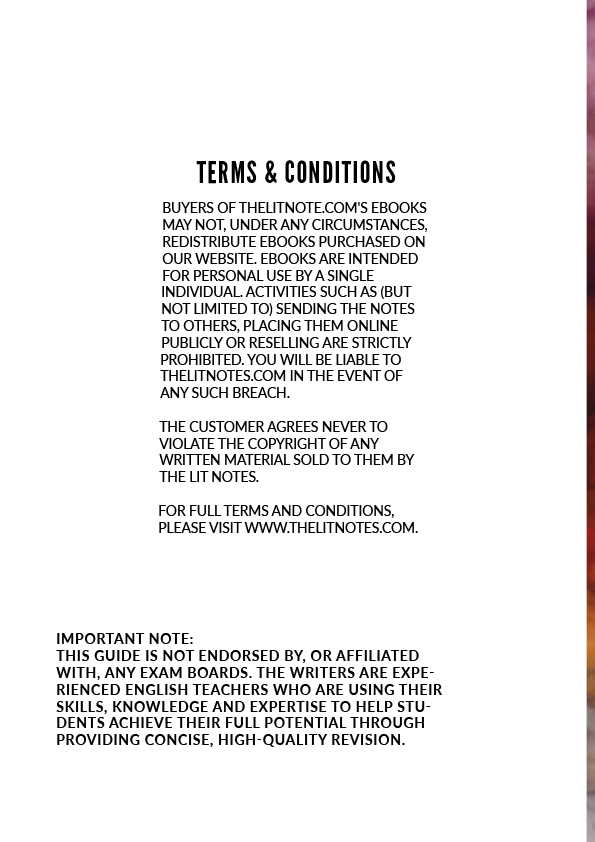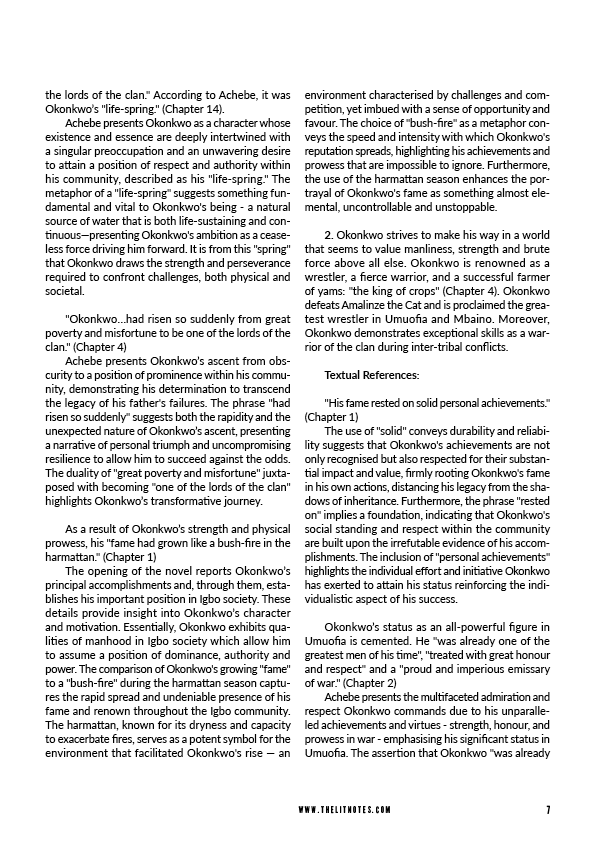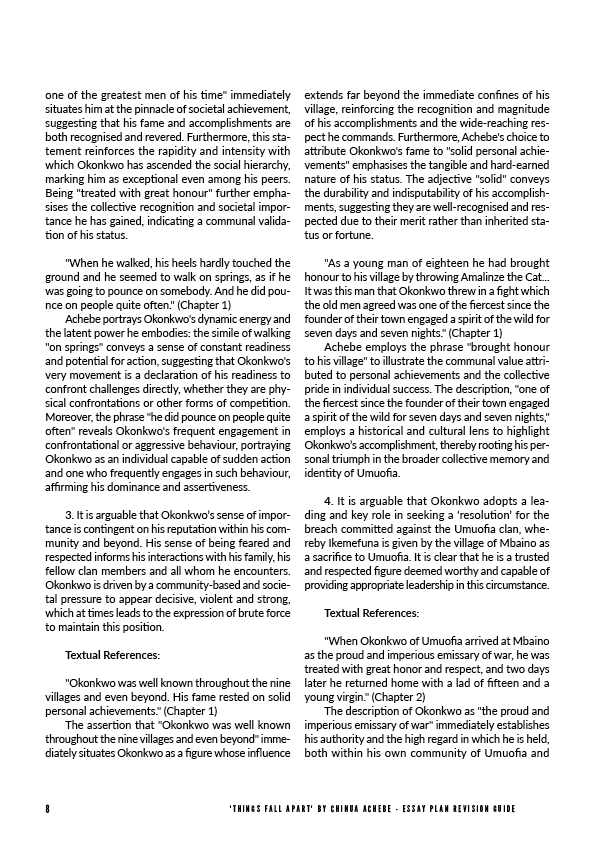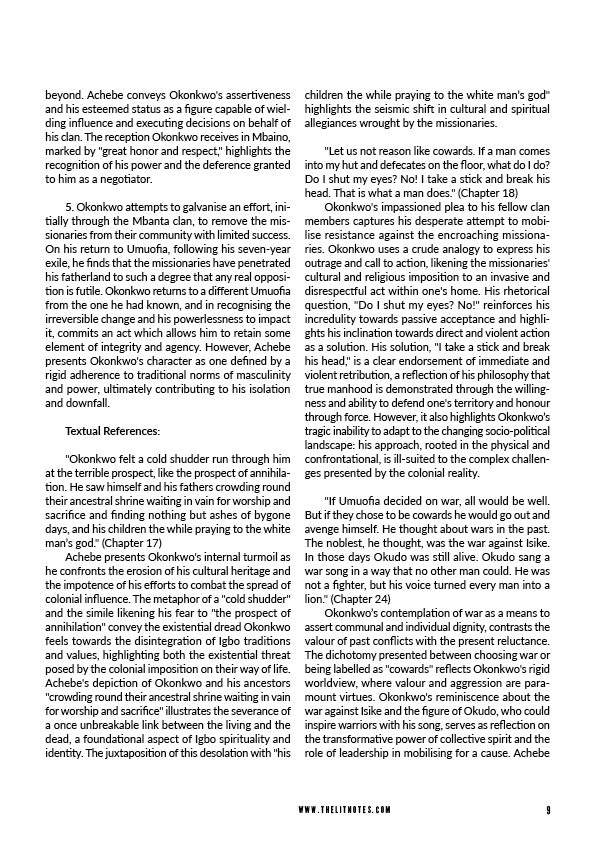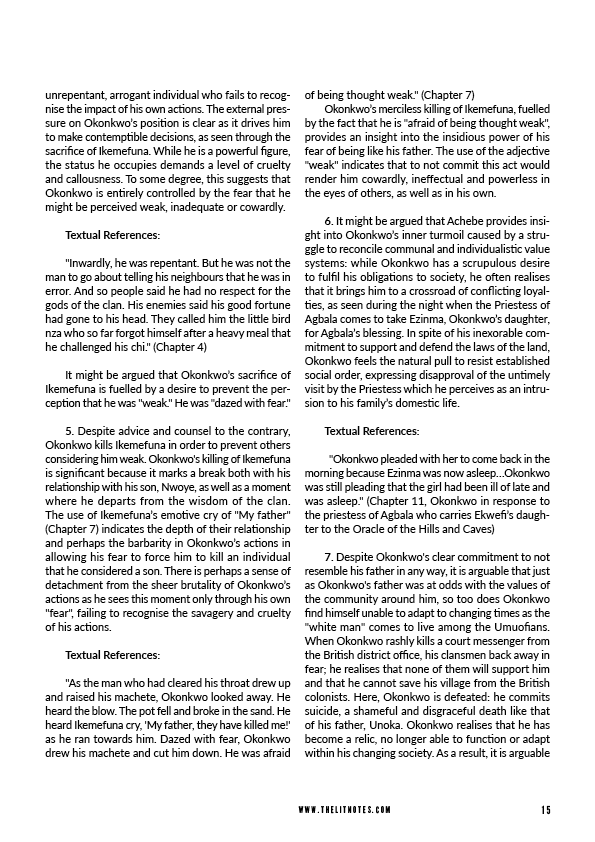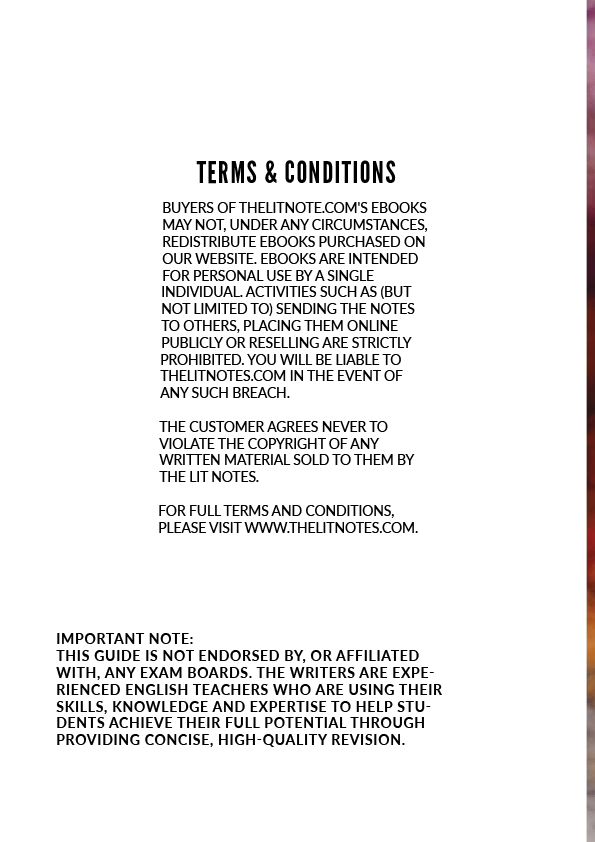Chinua Achebe, Things Fall Apart - Presentation of Nwoye Essay Plan - eBook
Detailed 8-page Essay Plan on the presentation of Nwoye in Chinua Achebe’s ‘Things Fall Apart’. The Essay Plan includes three separate sections:
Section 1: Throughout the novel, Achebe emphasises Nwoye’s inability to fulfil his father’s expectations or to comply with the masculine standards consistently imposed upon him. There is a sense of contrast established between Nwoye and his father, Okonkwo, whereby the former is considered to exhibit effeminacy and weakness in opposition to his father’s uncompromising masculinity and strength. It is clear that the relationship between Okonkwo and Nwoye is ultimately strained and fraught with tension, characterised by a sense of unease. Arguably, Okonkwo’s attitude and approach towards his son is fundamentally shaped by his perception of Nwoye’s failures and limitations.
Section 2: It is arguable that Nwoye is forced to suppress and conceal certain aspects of his character, traits and identity as a result of external familial and societal pressures. It might be argued that Nwoye cannot express his emotions as he feels them, because his father, Okonkwo, has taught Nwoye to believe that the expression of emotion is "effeminate" and a sign of weakness. Thus, Nwoye behaves in a way that serves to restrict, suppress or avoid his sincere feelings and emotions. The unavoidable consequence of this is despair, frustration and inner turmoil.
Section 3: Throughout the novel, the reader is provided with an insight into Nwoye’s sense of inner turmoil and lack of real connection with the Umuofian way of life. Furthermore, in view of Nwoye’s sensitivity and deep concerns about certain customs of his people, he is more receptive and responsive to the new, more humane-appearing doctrine offered by the missionaries. As a result, there appears to be a 'gap' or an emptiness which the missionaries and the Christian religion begin to fill or answer. Nwoye’s departure from the community of Umuofia indicates the tentative, fragile connections that exist with Umuofian society, which can readily be replaced by something different.
After purchase, you'll receive a link to download your Essay Plan. Let's get to work!
Detailed 8-page Essay Plan on the presentation of Nwoye in Chinua Achebe’s ‘Things Fall Apart’. The Essay Plan includes three separate sections:
Section 1: Throughout the novel, Achebe emphasises Nwoye’s inability to fulfil his father’s expectations or to comply with the masculine standards consistently imposed upon him. There is a sense of contrast established between Nwoye and his father, Okonkwo, whereby the former is considered to exhibit effeminacy and weakness in opposition to his father’s uncompromising masculinity and strength. It is clear that the relationship between Okonkwo and Nwoye is ultimately strained and fraught with tension, characterised by a sense of unease. Arguably, Okonkwo’s attitude and approach towards his son is fundamentally shaped by his perception of Nwoye’s failures and limitations.
Section 2: It is arguable that Nwoye is forced to suppress and conceal certain aspects of his character, traits and identity as a result of external familial and societal pressures. It might be argued that Nwoye cannot express his emotions as he feels them, because his father, Okonkwo, has taught Nwoye to believe that the expression of emotion is "effeminate" and a sign of weakness. Thus, Nwoye behaves in a way that serves to restrict, suppress or avoid his sincere feelings and emotions. The unavoidable consequence of this is despair, frustration and inner turmoil.
Section 3: Throughout the novel, the reader is provided with an insight into Nwoye’s sense of inner turmoil and lack of real connection with the Umuofian way of life. Furthermore, in view of Nwoye’s sensitivity and deep concerns about certain customs of his people, he is more receptive and responsive to the new, more humane-appearing doctrine offered by the missionaries. As a result, there appears to be a 'gap' or an emptiness which the missionaries and the Christian religion begin to fill or answer. Nwoye’s departure from the community of Umuofia indicates the tentative, fragile connections that exist with Umuofian society, which can readily be replaced by something different.
After purchase, you'll receive a link to download your Essay Plan. Let's get to work!
Detailed 8-page Essay Plan on the presentation of Nwoye in Chinua Achebe’s ‘Things Fall Apart’. The Essay Plan includes three separate sections:
Section 1: Throughout the novel, Achebe emphasises Nwoye’s inability to fulfil his father’s expectations or to comply with the masculine standards consistently imposed upon him. There is a sense of contrast established between Nwoye and his father, Okonkwo, whereby the former is considered to exhibit effeminacy and weakness in opposition to his father’s uncompromising masculinity and strength. It is clear that the relationship between Okonkwo and Nwoye is ultimately strained and fraught with tension, characterised by a sense of unease. Arguably, Okonkwo’s attitude and approach towards his son is fundamentally shaped by his perception of Nwoye’s failures and limitations.
Section 2: It is arguable that Nwoye is forced to suppress and conceal certain aspects of his character, traits and identity as a result of external familial and societal pressures. It might be argued that Nwoye cannot express his emotions as he feels them, because his father, Okonkwo, has taught Nwoye to believe that the expression of emotion is "effeminate" and a sign of weakness. Thus, Nwoye behaves in a way that serves to restrict, suppress or avoid his sincere feelings and emotions. The unavoidable consequence of this is despair, frustration and inner turmoil.
Section 3: Throughout the novel, the reader is provided with an insight into Nwoye’s sense of inner turmoil and lack of real connection with the Umuofian way of life. Furthermore, in view of Nwoye’s sensitivity and deep concerns about certain customs of his people, he is more receptive and responsive to the new, more humane-appearing doctrine offered by the missionaries. As a result, there appears to be a 'gap' or an emptiness which the missionaries and the Christian religion begin to fill or answer. Nwoye’s departure from the community of Umuofia indicates the tentative, fragile connections that exist with Umuofian society, which can readily be replaced by something different.
After purchase, you'll receive a link to download your Essay Plan. Let's get to work!
